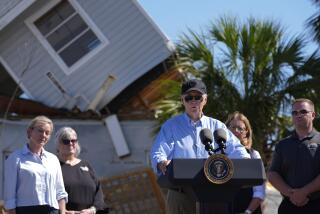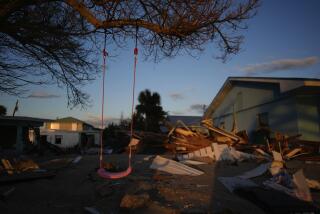Sweaty residents share frustrations with governor
- Share via
POINCIANA — Her brow dripping with sweat, a weary Pamela Loving approached Gov. Jeb Bush with an outstretched hand Tuesday.
“How are you doing?” Bush asked.
“I’m hot,” Loving, 43, said bluntly, shaking Bush’s hand. Power and air conditioning were out at her home in Poinciana, a sprawling community of roughly 36,000 on the Polk and Osceola county line. Pelting rain flooded her kitchen, and she feared that the snakes that commuted to her back yard after Hurricane Charley had plans to creep into her bed.
Sweaty residents from Kissimmee to Bartow shared their frustrations with Bush as he toured recovery efforts in some of the worst-ravaged areas in Central Florida.
“I’m here to say significant help is here, and significant help is on the way,” Bush announced at a stop at Osceola County’s emergency-operations center.
The Republican governor denied his decision to visit heavily Hispanic Poinciana was based on political calculations, though winning support in the area could be doubly important in the November presidential election. His brother President Bush and Democratic candidate Sen. John Kerry are wooing the crucial Hispanic vote, and Poinciana is part of the Interstate 4 corridor where both nominees are waging a fierce battle.
“No one is asking whether you’re a Republican or Democrat down here,” Bush said.
Likewise, U.S. Sen. Bill Nelson, D-Fla., said his visit later in the day to Osceola’s emergency-operation center in Kissimmee had nothing to do with politics, though he was bearing news of a potential $2.5 billion in federal disaster funds for Florida.
“You can’t ignore this is a swing state,” Nelson said. “And the I-4 corridor is the swing portion of the swing state. But this just happens to be where the disaster strikes.”
Many cheered and waved as Gov. Bush swept into the Osceola Square Mall “comfort station” in Kissimmee, where food, water and ice were available. Some on hand said the governor’s brother will get their vote.
At the Lake Wales comfort station at the city’s municipal complex, people in the mostly black and Hispanic neighborhood stood 30 people deep in lines for food and water. Bush was peppered with questions, though many were preoccupied with basic concerns.
Eddie Jean Rivers, 68, scurried away from the rush of onlookers, carrying two gallons of water and a bag filled with donated canned soup and snacks. The grandmother simply wanted her electricity back.
“Everybody in my community’s home is without power and all torn up,” she said, her hair still in curlers.
Loving expressed similar sentiments as she ate a free serving of jambalaya and peaches at the Poinciana stop. She raised her bottle of donated water to the governor.
“I’m going to drink this one on him,” Loving said and took a long swig.
Monica Scott of the Sentinel staff contributed to this report. Willoughby Mariano can be reached at [email protected] or 407-931-5944.
More to Read
Sign up for Essential California
The most important California stories and recommendations in your inbox every morning.
You may occasionally receive promotional content from the Los Angeles Times.










